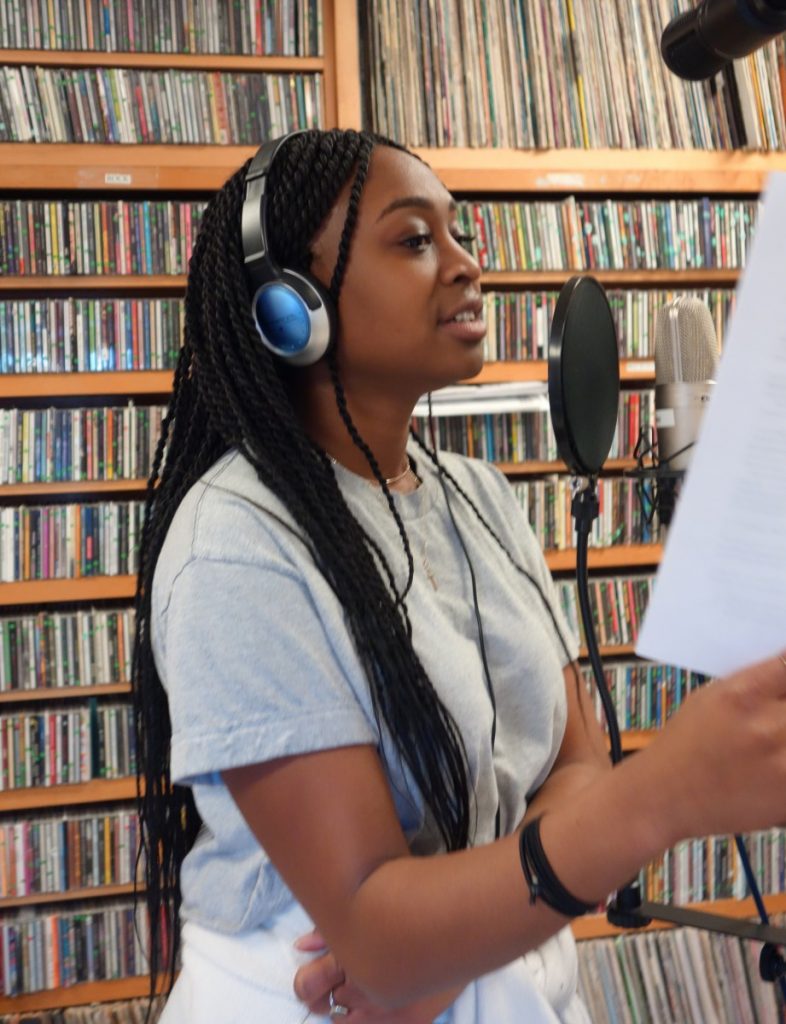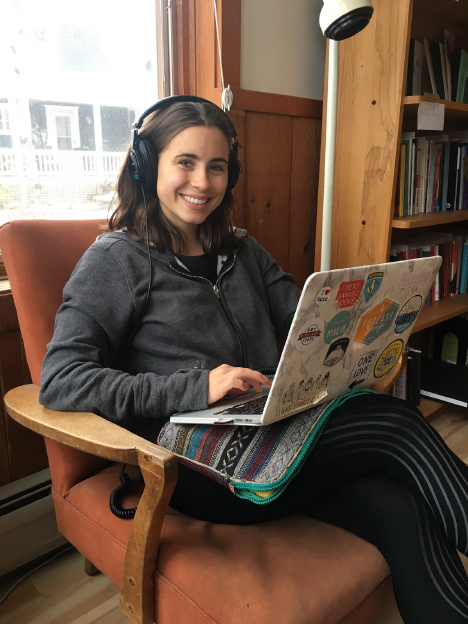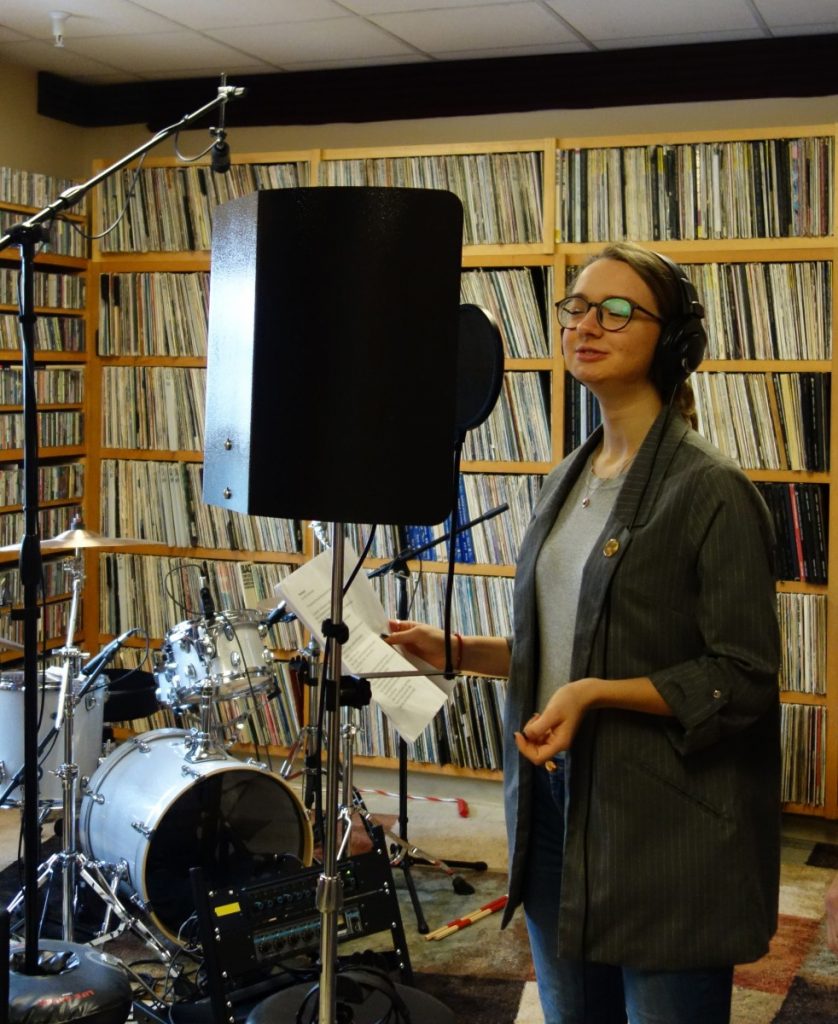


The NER Out Loud podcast began as a spin-off to our live annual event featuring student actors and orators, and has grown to include a Vermont Writers Series, in which local NER authors read their own work, as well as episodes that feature authors reading selections from recent issues. The podcast is hosted and edited by Middlebury student interns in collaboration with the NER staff. Tune in to hear new literature soar off of the page in a variety of voices and formats.
Subscribe on Apple Podcasts or Spotify.
Maya Bargdorf, Rowan Heffelfinger, and Kate Ryan—three Middlebury College seniors—read an excerpt of Clara Thomas Bailey, a play by Caridad Svich.
After the reading, podcast host Katie Futterman talks to Svich about how she came to write plays, her approach to audience, and the multiple anxieties that influence this play.
An excerpt of Clara Thomas Bailey was published in NER 44.3 (fall 2023). It is a portrait-in-motion that takes place over the course of one hour in a person’s life—and hour that spans years of feeling.
Hosted by summer interns Gavin Richards and Cali Jantzen, this episode includes a reading of “Wild Animals” by Joan Leegant, followed by a short interview with the author.
The conversation explores the volatile nature of family, Joan’s unique syntax, loyalty to the sentence, the writer as an “unconscious” medium, and the author’s advice on discovering one’s own process.
“Wild Animals” was first published in NER 44.2 (summer 2023).
Irish poet Nessa O’Mahony reads her poem “Cillín,” published in NER 44.2, followed by an interview with summer interns Cali Jantzen and Gavin Richards.
Their discussion traverses the “hidden histories” of O’Mahony’s home country, Ireland, the politics of memory, and the role of poetry in reckoning with the past. The poem appears in NER‘s special feature “The Door Left Wide: Poets in Tribute to Eavan Boland.”
El Williams III reads his poem “There Was a Brood,” first published in NER 44.1, followed by an interview with Yardena Carmi.
Their discussion explores writing about place and personal experience, as well as the poet’s inspirations for this piece, which turns car trouble, summer heat, and a brood of cicadas into poetry.
Katie Moulton reads an excerpt from her essay “The Elvis Room” (NER 43.3), followed by a conversation with NER podcast producer and host Becca Clark.
The author discusses her writing and editing processes, memorializing her dad, her family’s fascination with Elvis Presley, and more.
Created, edited, and hosted by NER summer interns Andrew Grossman and Kate Sadoff, features a reading and conversation with A. E. Kulze, author of the short story “The Ladybugs” from NER 43.2 (summer 2022).
After reading an excerpt from her story, Kulze talks about her writing process, the role of the unconscious in forming the whole, and the joy of a perfect editorial cut. She also speaks more broadly about gender and domesticity, the failures of contemporary feminism, and the Desert Mothers, who’ve been largely forgotten to history.
Hosts Andrew Grossman and Kate Sadoff present an excerpt from the play “Splits/kin,” co-authored by Milia Ayache and Amina Hassan, followed by a conversation with the authors.
They talk about their process of collaboration, the influence of fairy tales and founding myths, and the global love affair between fathers and their television sets.
The excerpt from the play is performed by Leslie Sainz and Andrew Grossman. “Splits/kin” was originally published in NER 43.2 (summer 2022) as part of the international feature on Lebanese writers.
Helene Achanzar reads her poem “Chicago,” followed by a conversation with podcast host Tejas Srinivasan about poetic structure, the meaning of “work,” paintings by Robert Ryman, and more.
Helene Achanzar is the winner of the 2022 NER Award for Emerging Writers, and her poems “Chicago” and “Etymology” can be found in NER 42.4.
Lu Mila and Michelle Marquez read two works of short fiction by Cuban authors Anna Lidia Vega Serova and Jorge Enrique Lage, both translated by Jennifer Shyue.
Podcast host Madison Middleton interviews Shyue, who talks about how she fell in love with translation and details some of the pleasures and perils of this exacting and creative work.
“Portrait of My Mother-in-Law with Subsequent Touch-Ups” by Anna Lidia Vega Serova and “Selections from Vultureffect” by Jorge Enrique Lage were originally published in NER 42.1, in spring 2021, as part of the “Cuban Literature Today” feature. Episode hosted, edited, and produced by Madison Middleton ‘22.5.
Jesse Lee Kercheval reads her essay “Crash,” followed by a conversation with Rebecca Amen.
The short essay interrogates the author’s memory of a shocking car accident that took place more than 50 years ago. In the interview, Kercheval further explores the nature of memory, essay writing in general, and her work as a translator of Uruguayan poetry.
“Crash” was originally published in NER 42.2 (summer 2021). This episode was produced by Rebecca Amen, Middlebury College class of 2022.
Michael McGriff reads an excerpt from his poem “Questions for the Interrogation,” followed by an interview with Yardena Carmi.
Their conversation explores the poem’s tribute to rural Oregon and Pablo Neruda, the limitations of memory and language, and Michael’s work as a translator.
“From Questions for the Interrogation” was originally published in NER 42.1. Episode hosted and produced by Yardena Carmi, Middlebury College class of 2023.
Celeste Levy reads the poem “Offered as Suddenly a Forest” by Zach Linge.
The reading is followed by a conversation between Celeste and Zach, who talk about the poem from both the reader’s and the writer’s points of view. They explore the origins of the poem’s images, writing during the pandemic, and the shades of truth that poetry can reveal.
“Offered as Suddenly a Forest” was originally published in NER 41.1, along with the poem “Branches.” Both poems can be read online. Episode hosted by Carolyn Kuebler, Editor of NER.
Madison Middleton reads from the short story “Suffering in Motion” by McKenna Marsden, followed by a conversation between reader and writer.
In this story, Hannah comes up against the limits of gender and of their own training regimen while preparing for the Boston Marathon. Madison and McKenna talk about the story from both the reader’s and the writer’s points of view, touching on the power of running and what it means to be nonbinary.
“Suffering in Motion” was originally published in NER in spring 2020. Episode hosted by Carolyn Kuebler, Editor of NER.
What can love mean?
An essay and a poem from recent issues of NER explore forms of love that exist outside the traditional bounds of romance and family.
Jessie van Eerden’s essay “A Story of Mary and Martha Taking in a Foster Girl,” from NER 40.3, is read by Francis Price ’21 and followed by an interview with the author. Next, Nimaya Lemal ’21.5 reads “Columbine and Rue,” a poem by John Freeman from NER 41.1.
This episode was produced and hosted by Courtney Wright, a Religion, Philosophy, and the Environment major in Middlebury’s class of 2021.5.
Simone Edgar Holmes presents four contemporary poets from the UK, from NER special feature in 41.2.
Shazea Quraishi reads “Elegy,” Seni Seneviratne reads “A Girl in the Woods,” Naomi Foyle reads “Made from Fibres Not Readily Penetrated,” and Sasha Dugdale reads “Chair No. 14.” All of these poems and more are available online as part of NER‘s recent feature of 15 contemporary British poets, edited by Marilyn Hacker.
Summer intern Simone Edgar Holmes brings together three recent NER authors in Episode 11. They examine the irregular passage of time, the meaning of home, and the curious bonds of family. The authors recorded these works in their own homes in Wymondham, England; Seattle, Washington; and Rochester, New York.
George Szirtes reads his poem “English Rain,” from the British poets feature in 41.2. Joannie Stangeland reads her poem “Parcel,” also from 41.2. Angelique Stevens reads from her memoir “The Only Light You’ve Got,” from NER 40.2
Hosted by Ruhamah Weil, Episode 10 presents Jan Beatty, Greg Johnson, and Jakob Maier, reading their own work from New England Review 40.4.
Jan Beatty reads her poem “The Body Wars,” Greg Johnson reads excerpts from his memoir “Daddy’s Aitch,” and Jakob Maier reads his poem “Food Court Ghost Town.” Ruhamah, our winter 2020 intern, also spoke briefly to Tricia Allen, of the Ilsley Public Library in downtown Middlebury, about the power of poetry.
What makes a good poem?
What makes a good story?
Listen to Dean Rader (“Troubled by Thoughts . . .” and “Once Again in Thought…”), Kathy Fagan (“Dahlia”), and Trey Moody (“A Story About Death”) read their memorable work from NER 40.4, bringing us owls and children, fathers and sons, death, dogs, and more. Middlebury College intern Susan Deutsch hosts the episode, and connects with local readers and librarians Renee Ursitti and Tricia Allen as well.
Hosted by Rahat Huda and Leila Markosian, Episode 8 of the New England Review podcast features the poem “Lark” by Corey Marks and the story “Indoor Animals” by Noah Bogdonoff.
“Lark” was originally published in New England Review 39.3 (2018), and is read here by Katie Marshall.
“Indoor Animals” was originally published in New England Review 39.4 (2018), and is read by Zachary Varricchione.
Episode 7, hosted by NER interns Rahat Huda and Leila Markosian, features two memoirs steeped in childhood, from NER Out Loud’s Vermont Writers Series.
“Teapot in Turquoise” (NER Digital) by Phoebe Stone, and “From the Beginning” (NER 39.2) by François Clemmons.
Episode 6, hosted and edited by Jeremy Navarro, is part of NER Out Loud’s Vermont Writers Series.
This episode features Jay Parini reading his short autobiographical piece, “A Beer with Borges” (NER 39.1) and Genevieve Plunkett reading her O. Henry Award–winning story, “Something for a Young Woman” (NER 36.3).
Episode 5, hosted and edited by Juliette Luini, is the first in NER Out Loud’s Vermont Writers Series.
This episode features poet Didi Jackson reading her poems published by NER—”The Burning Bush” (NER 39.1) and “Brancusi’s Bird in Space” (NER Digital)—along with several poems from her forthcoming collection, Moon Jar (2020).
Episode 4 presents two short stories, exploring female identities and experiences, by Emily Geminder and Alla Gorbunova, translated from the Russian by Elina Alter. Hosted by Megan Job and read by students from Oratory Now. Edited by Hannah McKenzie and Juliette Luini.
• “Phnom Penh 2012” by Emily Geminder (NER 36.4), read by Emily Ma.
• “Biomass” by Alla Gorbunova (NER 39.2), read by Masha Makutonina.
Hosted by Megan Job, this episode presents a poem and a story, both using form and language to illustrate the contemporary condition. Read by students from the Middlebury Theatre Department and Oratory Now. Edited by NER intern Tess Weitzner.
• “In Order of Appearance” by Heather Christle (NER 39.2), read by Melanie Rivera
• Excerpts from “Modal Window” by Janet Towle (NER 39.2), read by Becca Berlind and Sam Tompkins Martin
Hosted by Kylie Winger, this episode showcases poems by three well-known and much-loved American poets. Read by students from the Middlebury Theatre Department and Oratory Now. Edited by NER intern Juliette Luini.
• “Sweet” by Bob Hicok (NER 37.1), read by Pele Voncujovi
• “Obit—Memory,” “Obit—Music,” and “Obit—Grief” by Victoria Chang (NER 38.3), read by Katie Mayopoulos
• “I Shot a Frog I Shot a Bird” (NER 36.1) by C. K. Williams, read by Will Koch
Two recent pieces from NER that converge on the themes of art and destruction. Edited and hosted by Juliette Luini; directed by Sam Tompkins Martin; read by students from the Middlebury Theatre Department and Oratory Now.
• “Shotgun Elegy,” a poem by Henry Kearney IV (NER 37.3), read by Will Koch.
• “Chinese Opera,” short story by Anne Raeff (NER 37.2), read by Gabby Valdivieso.
Special thanks to Dana Yeaton and Oratory Now for their support in the creation and production of these podcasts.
